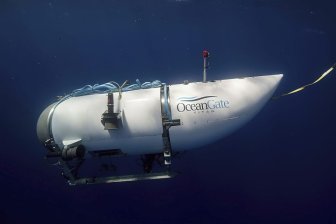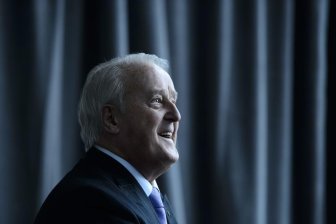Alberta adds new EV tax, increases land titles levy in 2024 budget
Albertans will have to save up a bit more to buy a new home or own an electric vehicle (EV) after Finance Minister Nate Horner released the “beer budget with an eye to the future” on Thursday.
Existing or would-be EV owners will have a new tax to pay when they register their vehicle.
As soon as January 2025, EV owners will pay the province $200 a year.
The province said EVs tend to be heavier than similar internal combustion engine (ICE) vehicles, and “cause more wear and tear on provincial roadways.”
“Since EV drivers obviously don’t pay a fuel tax, this tax will be their contribution to keep provincial roads maintained and to support other public services,” Horner said.
“This tax rate is in line with the estimated annual fuel tax paid by the driver of a typical internal combustion vehicle in Alberta,” the province’s fiscal plan said.
“The tax will not apply to hybrid vehicles.”
The province conceded that not all of the fuel tax goes to road maintenance, but “there are nevertheless fairness concerns” and long-term challenges with declining fuel tax revenue.

The new provincial tax comes a day after EV manufacturer Tesla opened up its charger network to vehicles from other manufacturers.
EV owners in Calgary were shocked at having to pay a provincial tax on their vehicles whose retail prices are already typically higher than regular vehicles.
“That’s insane,” Jackson Khurma told Global News. “Now everything is so expensive.”
“Shouldn’t they be promoting electric vehicles by giving more rebates instead of taking more money?” Rahul Tomar, who moved to Alberta from Ontario on Thursday, said.
“The reason you buy electric is to save money and not pay more.”
The Alberta government expects the new EV tax will bring in $1 million in the 2024-25 fiscal year, $5 million in 2025-26 and $8 million the year after.

The province said more details will be revealed in the fall when legislation is introduced.
On social media, University of Calgary economics professor Blake Shaffer said it’s “reasonable” to question the province’s claim of “fairness.”
Shaffer wrote that EVs are generally heavier than their ICE counterparts, but that a gasoline-powered truck is heavier than an electric car.
According to his calculations, a Nissan Leaf driver, with a curb weight of around 1,600kg, that drives 10,000 kilometres in a year would face the equivalent of a 25-cent-per-litre gasoline tax.
Without rebates, Alberta’s gas tax is usually 13 cents per litre.

He said a Ford Lightning EV pickup truck, with a curb weight of between 2,700 to 3,100 kg, that drives 20,000 kilometres in a year would face a 12 cent per litre equivalent.
“Vehicle registration fees for all vehicles should be based, in part, on their weight and annual kilometres driven,” Shaffer wrote on X, formerly known as Twitter. “Making that change would better target externalities and transition the tax system for an EV future.”
The leader of the Opposition said she would not object to establishing “equity” between EV and ICE vehicle drivers, and appreciated the need to fund road maintenance. But she noted the new tax propagated a couple of themes.
“This is a government that’s always keen to make anybody doing anything to reduce emissions pay more or be told they can’t do it at all,” Rachel Notley said.
“It’s just another fee increase and there’s a long list of fee increases embedded and buried in this budget.”
Alberta is one of few provinces which has not offered an EV purchasing incentive. The federal government offers up to $5,000 for the purchase or lease of light-duty zero-emission vehicles, including EVs.
Canada’s new Electric Vehicle Availability Standard released in December became part of the government’s plan to have all new vehicles sold in 2035 be zero-emission vehicles. Critics said the EV charging network across the country is in need of expansion to meet the federal plan.

Adding to the house purchase bill
A new Land Titles Registration Levy of $5 per $5,000 of value will replace variable land title fees of $2 per $5,000 of property value and $1.50 per $5,000 of mortgage value.
The province said for a $450,000 home purchase with 10 per cent down, the levy will be $955, an increase of $553.50.
The province said land title charges were less than similar ones in provinces like B.C., Saskatchewan, Ontario and Quebec.
The province’s fiscal plan wasn’t able to specify when these changes would come into effect, but said the related legislation would be tabled this spring.
The new land titles levy will add an estimated $45 million this fiscal year and $91 million next year.
Average house prices are expected to rise by 8.8 per cent in 2025, according to the Canadian Real Estate Association, with the average price forecasted at $520,837 next year.
Vaping and tobacco taxes doubling
Alberta hopes an increased ‘sin tax’ on vaping and tobacco products will help public health efforts, calling it an “effective tool for motivating people to quit.”
Alberta will be charging the same vaping tax as the federal government put into place in October 2022: $1 per 2mL or gram, or fraction of, for the first 10mL or g of vaping substance and $1 per 10mL or gram on top of that.
The doubled vaping tax comes into effect on Jan. 1, 2025. It’s expected to bring in $4 million this fiscal year and $18 million next fiscal year.
Cigarette taxes will jump by 2.5 cents to 30 cents per cigarette, effective tomorrow. And smokeless tobacco products will go up by 7.5 cents to 35 cents per gram.
The province said those increases will bring Alberta’s tobacco tax rates on those products in line with neighbouring provinces, and will bring in an estimated $25 million in additional revenue in the 2024-25 fiscal year.
The government also plans to establish and fund a “cross-ministry/agency working group” to assess how bad a problem contraband tobacco, on which the province does not collect taxes, is in Alberta.
More on Lifestyle
&© 2024 Global News, a division of Corus Entertainment Inc.
View original article here Source













